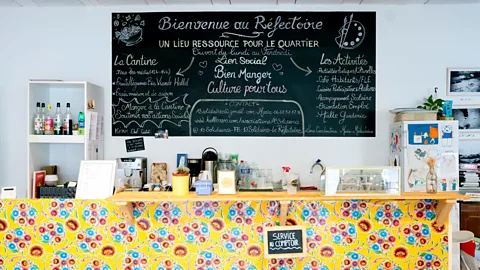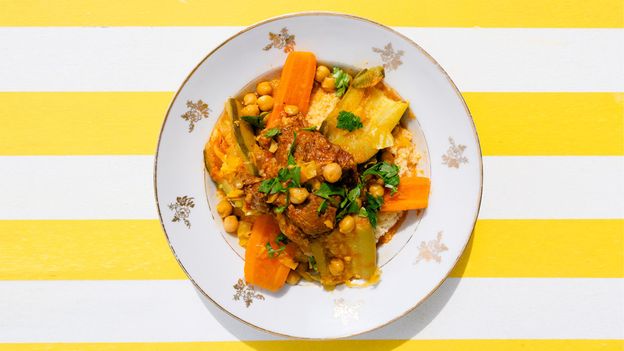Travellers are slowly discovering La Cabucelle, with its Moorish facades and Armenian churches. Everyday bar Monday, an epic Marché aux Puces (flea market) bustles with antiques, home clearance treasures and vintage Olympique de Marseille football jerseys. Cardo hopes they will book Le Réfectoire when they come. “If you’re buying something here,” she says, “you give money for activities to people who need them.”
 Caroline DutreyPart of the city’s growing restaurants solidaires movement, Le Réfectoire offers high-quality and affordable meals (Credit: Caroline Dutrey)
Caroline DutreyPart of the city’s growing restaurants solidaires movement, Le Réfectoire offers high-quality and affordable meals (Credit: Caroline Dutrey)
The walk from La Cabucelle to Marseille’s rejuvenated docklands feels like a veritable world tour. E-scooters flit like barracudas through streets serving Tunisian lablabi soup and Comoran breadfruit crisps. An influencer could hook 1,000 followers with snapshots of Laotian spring rolls and staircases painted in colourful rainbows. In the docks themselves, ferries make nightly runs to Tangier, Tunis and Algiers, while container ships arrive from around the world.
Back at Le République, chefs are preparing evening starters like leek vinaigrette with a Parmesan biscuit and grated bottarga. Aside from serving €1 meals to diners in need of nutritious cuisine, the restaurant’s central theme is “insertion professionnelle” – helping marginalised people back into work.
“[We’ve employed] people with autism, single mothers who haven’t been able to work for 20 years, people who can’t read,” says Sylvain Martin, who co-founded the restaurant with chef Sébastien Richard. “We have had so many profiles that I can’t list them all!”
Some staff have come to Le République from Baumettes Prison, Marseille’s toughest jail, where the last person in the Western world to be executed by guillotine took place in 1977. The prison is now home to Marseille’s most curious restaurant solidaire, Les Beaux Mets, which translates as “the beautiful dishes” and is a play on the maximum security penitentiary’s name. The fine-dining restaurant, open for lunch only, was created by the godfather of Marseille cuisine, Gérald Passedat (also the brains behind the L’Après M’s gourmet burger) after learning that former offenders tended to return to crime in the absence of meaningful work.


